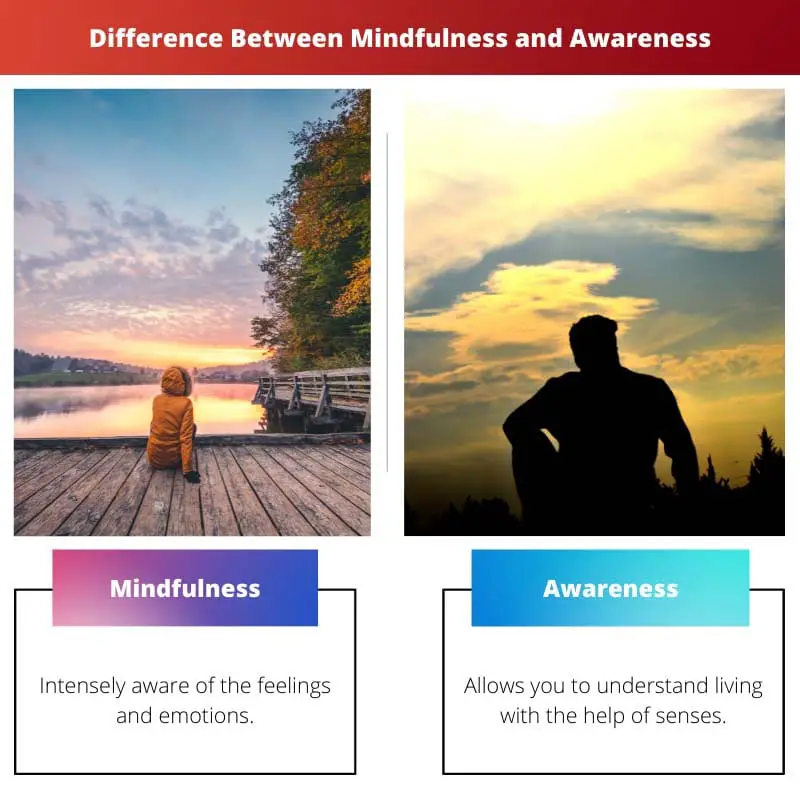Mental Health is of prime importance to every human. This is a trending concept these days among people of different age groups. Many institutes and meditation centres have come up with new-age techniques that help well-being these days.
But the traditional process of meditation is not bypassed. While discussing mental wellness and living in peace, two fabulous terms are interchangeably used; Mindfulness and Awareness. Though they may sound similar, there are crucial differences between the two.
Key Takeaways
- Mindfulness is being present and aware of one’s thoughts, feelings, and surroundings without judgment or distraction.
- Awareness is being conscious and alert without necessarily focusing on one particular thing.
- While mindfulness involves intentional focus and a non-judgmental attitude, awareness can be more passive and open-ended.
Mindfulness vs Awareness
Mindfulness is a mental state characterized by being fully present and engaged in the current moment without judgment or distraction. Awareness is a broader term that refers to being conscious of one’s surroundings, emotions, and thoughts. It involves being attentive and observant.

Mindfulness is a technique in meditation that allows you to sense your inner self at a particular moment. This includes feelings and emotions; you are supposed to be intensely aware of this while meditating.
The only guideline is as you sense the emotions, you are expected to be non-judgemental.
Awareness, on the other hand, is also being in the moment, but it is more conscious than the mindfulness technique. The way you feel, perceive and absorb the happenings around you is the key concept of awareness. The knowledge of understanding an event or a situation is awareness.
Comparison Table
| Parameters of Comparison | Mindfulness | Awareness |
|---|---|---|
| Fundamental Aspect | Mindfulness is an introspection based technique. | Awareness is an acceptance-based technique. |
| Mind Control | Intensely aware of the feelings and emotions. | Allows you to understand living with the help of senses. |
| Impact | Improves Thought Processes | Improves Manner of Living |
| Past and present thoughts | It shall be controlled. | Awareness helps you not take the previous instance to accept or reject a current scenario. |
| Mood | Mindfulness does not help in this context. | Awareness helps in controlling mood swings. |
What is Mindfulness?
Mindfulness is a concept in meditation that allows a person to be present in the moment without any judgment in the mind. Focusing on the current situation is the key factor in mindfulness.
The incredible ability to accept all the thoughts that come to your mind and allow them to fly away, causing no damage to your mind and mental health.
It is a general tendency of humans to constantly think about the future. This may create anxiety and also make you worry about the future. This worry may deepen to become depression too.
Meditating with sheer focus on shying away from the thoughts can have definite benefits for your life and well-being.
The basic agenda of mindfulness is to stop wasting time on something that has not happened and that too it is in the future. Allowing yourself to be present in the moment makes you completely conscious of what you are doing daily.
If one cultivates the habit of mindfulness every day, it can bring profound changes to one’s life.
Thoughts are common. Worrying about what we think is a waste of time. This is the one that shall be extradited by mindfulness training. Train your mind to enjoy the thoughts that come your way. A mind without thought is certainly not possible, but controlling the thoughts is in your hands.
While other techniques of meditation teach about external influences, this is sheer internal. Introspection of mind and thoughts begins as you train your mind for complete mindfulness. This brings you to make peace with the past and stop thinking about the future unnecessarily.

What is Awareness?
Awareness is yet another technique that is taught during the meditation process that allows you to use your senses to the complete effect. As mindfulness allows the thoughts to fly away without making any judgment, awareness allows you to accept the happenings around you.
Awareness makes you fully aware of the nature of life through your senses. You can fully experience life with touch, smell, sound and taste.
Senses are the prime information source to know what is happening externally. When you accept it and living with it without judgment makes one’s life prolific.
The technique helps you live your life completely with the help of sensory awareness of the surroundings. Awareness helps you to know the intentions of others too. You can appropriately respond to the same without hurting yourself.
Awareness helps you to gain focus on a lot of things that we might miss on a day-to-day basis. Mostly, we disregard others when we live life on autopilot. Sheer consciousness of the actions happening outside shall help you live life with completeness.
It is advised to practice Awareness in everyday life. It helps one gain the best attributes of kindness, care and understanding of others.

Main Differences Between Mindfulness and Awareness
- The main difference between Mindfulness and Awareness is the outcome of practising the techniques. Mindfulness helps you live in the moment and float away all unwanted thoughts, while Awareness helps you stay in the moment by observing the things happening around you.
- Mindfulness uses the mind and thoughts as the prime element to create completeness in life, whereas Awareness uses our senses to accomplish the same.
- Mindfulness helps one be non-judgemental of thoughts, while awareness helps you be non-judgemental of other people.
- Mindfulness is a technique that helps one inculcate self-love, while awareness helps in being caring and understanding of others.
- Mindfulness helps you think only about the present, while Self Awareness allows you to live in the moment.

- https://www.sciencedirect.com/science/article/abs/pii/S0191886907001973
- https://www.sciencedirect.com/science/article/abs/pii/S0191886911005058

The focus on improving thought processes through mindfulness and living with the help of senses through awareness is an enlightening concept.
Meditation is an essential practice to improve mental health, and understanding the differences between mindfulness and awareness is crucial for a successful practice.
The key differences between mindfulness and awareness are highlighted well in this article. The impact of both practices on mental well-being is profound.
Practicing mindfulness and awareness in everyday life can lead to a better understanding of oneself and the world around us.
I appreciate the detailed comparison table that further clarifies the fundamental aspects and impact of mindfulness and awareness.
The examination of mindfulness and awareness as introspection and acceptance-based techniques is thought-provoking.
The sensory awareness emphasized in the concept of awareness is a unique and beneficial approach to understanding the nature of life and improving interpersonal interactions.
Mindfulness and awareness are powerful tools for enhancing mental well-being by guiding us to be present in the moment and accept our surroundings without judgment.
The distinction between mindfulness and awareness in meditation is well articulated, and the benefits of each technique on mental health are enlightening.
The practices of mindfulness and awareness can bring about profound changes in one’s life by fostering peace with the past and enabling a focus on the present moment.